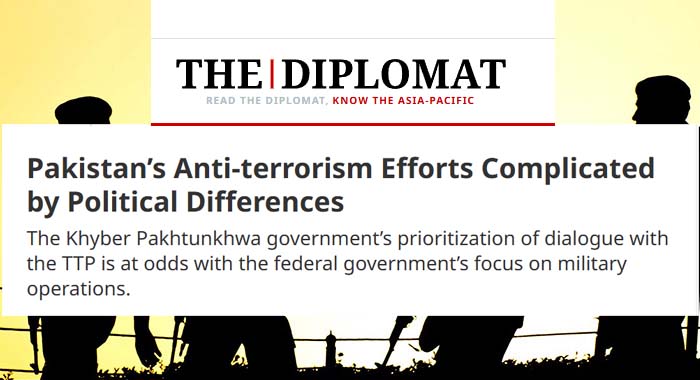Pakistan’s counterterrorism efforts against the banned Tehreek-e-Taliban Pakistan (TTP) are being challenged by differing approaches between the federal and Khyber Pakhtunkhwa (KP) governments, according to a report published in The Diplomat. The divergence in strategy, it said, has slowed progress towards formulating a comprehensive national framework to deal with the evolving threat.
The report stated that the federal government and state institutions have taken a firm stance against negotiating with the TTP, while the KP administration, led by the Pakistan Tehreek-e-Insaf (PTI), has signaled its willingness to explore dialogue. This difference has emerged even as KP remains the frontline province most directly affected by militant violence due to its proximity to Afghanistan.
According to The Diplomat, Pakistan’s policy towards militancy has historically alternated between military operations and negotiations. During the PTI government at the center from 2018 to 2022, dialogue and rehabilitation of TTP members were pursued with the intention of reducing violence. However, the approach provided space for regrouping, leading Islamabad to adopt a more robust stance today that rules out appeasement.
The publication highlighted that Chief Minister Ali Amin Gandapur recently announced a provincial initiative to engage the Afghan Taliban on security issues, which was seen as a move that bypassed constitutional mechanisms. While the federal government has consistently engaged Kabul directly — alongside partners such as China — to curb TTP activity, challenges remain as the group continues to operate across the border. Pakistani officials told The Diplomat that more than 120 Afghan nationals have been killed in 2025 while fighting alongside the TTP inside Pakistan.
Another area of difference noted was the handling of illegal Afghan refugees. While Islamabad has accelerated their repatriation due to security concerns, the KP government has expressed reluctance to implement the drive. Analysts quoted by the publication cautioned that divergent narratives on such sensitive issues could inadvertently embolden extremist propaganda.
At the same time, the report acknowledged that frustrations in KP over past military-heavy approaches, which displaced local communities, continue to shape provincial rhetoric. Nevertheless, The Diplomat emphasized that militants exploit political rifts, making cooperation between federal and provincial authorities essential for long-term stability.
The article concluded that Pakistan’s success against terrorism depends on unity across the political spectrum. It underscored that transcending partisan differences and working collectively on a national security framework is vital to ensure that groups such as the TTP are denied any space to operate.





